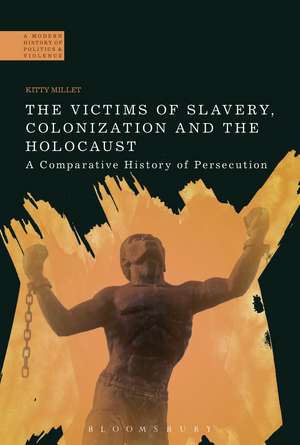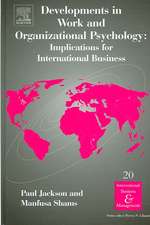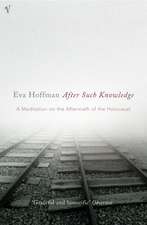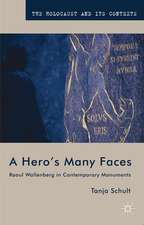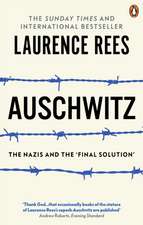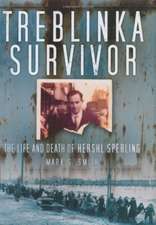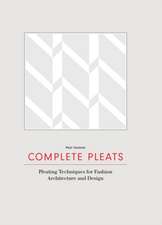The Victims of Slavery, Colonization and the Holocaust: A Comparative History of Persecution: A Modern History of Politics and Violence
Autor Professor Kitty Milleten Limba Engleză Paperback – 19 sep 2018
| Toate formatele și edițiile | Preț | Express |
|---|---|---|
| Paperback (1) | 238.29 lei 6-8 săpt. | +87.99 lei 4-10 zile |
| Bloomsbury Publishing – 19 sep 2018 | 238.29 lei 6-8 săpt. | +87.99 lei 4-10 zile |
| Hardback (1) | 569.60 lei 6-8 săpt. | |
| Bloomsbury Publishing – 8 mar 2017 | 569.60 lei 6-8 săpt. |
Preț: 238.29 lei
Preț vechi: 306.03 lei
-22% Nou
Puncte Express: 357
Preț estimativ în valută:
45.60€ • 47.73$ • 37.95£
45.60€ • 47.73$ • 37.95£
Carte tipărită la comandă
Livrare economică 31 martie-14 aprilie
Livrare express 21-27 februarie pentru 97.98 lei
Preluare comenzi: 021 569.72.76
Specificații
ISBN-13: 9781472509970
ISBN-10: 1472509978
Pagini: 280
Ilustrații: 4 bw illus
Dimensiuni: 233 x 155 x 22 mm
Greutate: 0.39 kg
Ediția:NIPPOD
Editura: Bloomsbury Publishing
Colecția Bloomsbury Academic
Seria A Modern History of Politics and Violence
Locul publicării:London, United Kingdom
ISBN-10: 1472509978
Pagini: 280
Ilustrații: 4 bw illus
Dimensiuni: 233 x 155 x 22 mm
Greutate: 0.39 kg
Ediția:NIPPOD
Editura: Bloomsbury Publishing
Colecția Bloomsbury Academic
Seria A Modern History of Politics and Violence
Locul publicării:London, United Kingdom
Caracteristici
Counters prevalent academic arguments for continuity in relation to the Holocaust and other mass violence
Notă biografică
Kitty Millet is Professor of Holocaust Studies and Comparative Jewish Literatures at San Francisco State University, USA.
Cuprins
List of IllustrationsAcknowledgementsList of AbbreviationsIntroduction: Comparative Histories of PersecutionPart I: Slavery1. A World of Slaves2. The Formula and 'the Being of Slavery'Part II: Colonialism3. A World of Colonies and the Evolving Colonial Consciousness4. The Empirical Colony in German Southwest Africa and a Formula of Colonization5. From a Formula for Colonization to a Formula of Extermination and Victims' 'Shared Sense'Part III: The Holocaust6. An Aryan World and the 'Worldlessness' of Jews7. 'Being' Exterminated and the Formulas of ExterminationConclusion: Observations on the Future Store, the Future Map and the FutureNotesBibliographyName IndexSubject Index
Recenzii
[An] ambitious and complex book . Significant for graduate collections. Summing Up: Highly recommended. Graduate students, faculty.
Kitty Millet's study sounds the subjectivity of persecution by looking at victims' lived experiences of colonial occupation, physical confinement, and large-scale violence. I was moved as much as informed by her evocation of "what was lost": the sense of absence, the being with death, a feeling "outside the world," "a people without the memory of autonomy." A thorough and creative inquiry into the shared sense of experience.
With The Victims of Slavery, Colonialism, and the Holocaust, Kitty Millet has delivered an extraordinarily compelling interpretation of three historical spheres that are rarely examined comparatively. Drawing primarily on victim and perpetrator narratives, Millet's brilliant analysis focuses on the victims' self-imagination, including their minds and physical bodies, toward the goal of surviving persecution.
Kitty Millet's comparative study offers a thought-provoking exploration of the imagined communities of victims and perpetrators of mass atrocities. In lucid prose, she draws from individual narratives to consider the subjectivity of victimization. A valuable addition to Genocide Studies.
Kitty Millet's study sounds the subjectivity of persecution by looking at victims' lived experiences of colonial occupation, physical confinement, and large-scale violence. I was moved as much as informed by her evocation of "what was lost": the sense of absence, the being with death, a feeling "outside the world," "a people without the memory of autonomy." A thorough and creative inquiry into the shared sense of experience.
With The Victims of Slavery, Colonialism, and the Holocaust, Kitty Millet has delivered an extraordinarily compelling interpretation of three historical spheres that are rarely examined comparatively. Drawing primarily on victim and perpetrator narratives, Millet's brilliant analysis focuses on the victims' self-imagination, including their minds and physical bodies, toward the goal of surviving persecution.
Kitty Millet's comparative study offers a thought-provoking exploration of the imagined communities of victims and perpetrators of mass atrocities. In lucid prose, she draws from individual narratives to consider the subjectivity of victimization. A valuable addition to Genocide Studies.
